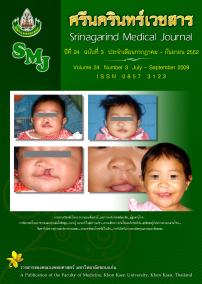ThaiScience
ThaiScience
SRINAGARIND MEDICAL JOURNAL
Volume 35, No. 01, Month JANUARY, Year 2020, Pages 89 - 97
Lifestyle and personal characteristic factors associated with overnutritional status among supporting staff of khon kaen university
Nattapong Anchalee, Benja Muktabhant
Abstract Download PDF
Background and Objective: The prevalence of obesity is increasing among Thai population. This cross-sectional analytic study aimed to evaluate the associations between lifestyle and personal characteristic factors with overnutritional status among the supporting staff of Khon Kaen University. Methods: 387 participants were evaluated the nutritional status by using body mass index (BMI) The BMI index of ≥ 23 kg/m2 was defined for overnutritional status. General information, time spent for sedentary activity and food consumption were obtained from individuals using structural questionnaire. Physical activity was assessed by using the global physical activity questionnaire. Multiple logistic regression was applied to examine the association of overweight and lifestyle factors. Results: The majority (77.8%) of the respondents was female with mean age of 42 years. Fifty-five percent of the participants were overnutrition. The participants who had physical activities at vigorous, moderate and low levels were 40.0, 23.8 and 36.2%, respectively. The average time spent for sedentary activities was 11.7 hours/day. According to food consumption, the subjects were at risk of being overweight in high and moderate risk levels at 19.7 and 73.1%, respectively. The following risk factors were significantly associated with overnutrition (p<0.05), i.e., male (adjusted OR =2.5, 95% CI: 1.39 to 4.35), age 41-60 years (adjusted OR =3.36, 95% CI: 2.08 to 5.44), education below bachelor degree (adjusted OR =3.18, 95% CI: 1.41 to 7.15), having obese relatives (adjusted OR =2.45, 95% CI: 1.54 to 3.88) and eating at night time (adjusted OR =1.87, 95% CI: 1.01 to 3.45). Conclusion: More than half of the supporting staff of the Khon Kaen University were overnourished. Weight control activities should be organized in this group, especially in males aged more than 40 years who have a low education degree and have obese relatives, and stopping / reducing eating at night time should be recommended.
Keywords
lifestyle, over-nutrition, supporting staff.SRINAGARIND MEDICAL JOURNAL
Published by : Faculty of Medicine, Khon Kaen University
Contributions welcome at : http://www.smj.ejnal.com/e-journal/journal/index.php
